Traveling with an infant can be a joy-filled experience, filled with new sights and sounds for both parent and child. Yet, it also presents unique challenges, none more significant than ensuring your baby’s nutrition is handled with the utmost care and precision. For those relying on baby formula, the need for secure, convenient, and hygienic storage becomes paramount. The days of cumbersome packing and the stress of maintaining the perfect temperature are a thing of the past.
This guide is designed to illuminate the best practices for storing powdered formula, whether you’re navigating the bustling terminals of an international airport or exploring a remote countryside. Understanding the importance of maintaining the quality of the powdered formula and the specific needs of your little one can make all the difference in enjoying a relaxed and pleasurable travel experience.
In the pages that follow, we will explore everything from choosing the right containers to considering temperature, mixing on-the-go, handling unexpected situations, and even international travel considerations. So buckle up and prepare to embark on a stress-free journey with your infant, equipped with the knowledge to make baby formula storage a breeze.
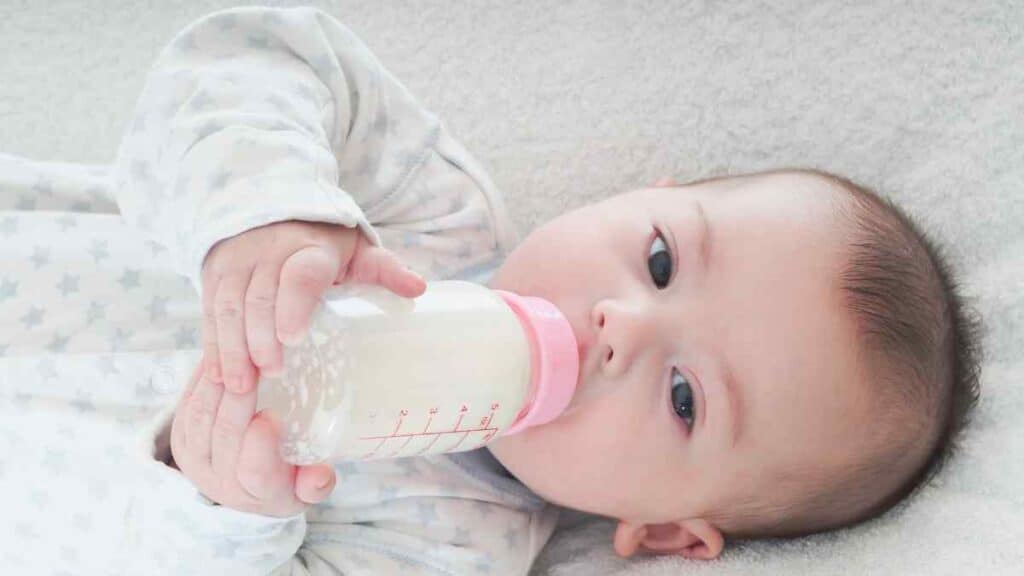
Understanding Baby Formula
Navigating the world of infant nutrition can seem overwhelming, especially when it comes to choosing the right baby formula for your child. This column will provide a brief overview of what baby formula is, discuss the different types, and emphasize the importance of maintaining quality. Understanding these aspects can help ensure your baby’s nutritional needs are met, especially when travelling.
What is Baby Formula?
Baby formula is a manufactured food designed to be a substantial equivalent to breast milk for babies who are not breastfed. It is specially formulated to support the baby’s immune system and growth and contains essential vitamins and minerals. When it comes to water for mixing formula, questions often arise such as “can babies drink purified water?” or “what is the difference between distilled vs purified water for a baby?” We will address these important concerns in this column.
Types of Baby Formula
1. Powdered Formula
- Formula Powder: Easily mixed with warm water, convenient for travel, and often used by many parents. It’s vital to use the right water, with common choices being distilled water for babies or purified water for babies.
- Powder Formula Dispensers: Handy tools for pre-measuring formula for travel.
- Travel Tips: Using bottled water or a formula dispenser can make the process seamless when traveling with baby formula.
2. Concentrated Liquid Formula
- Mixing with Water: Requires mixing with equal parts water. A bottle warmer can help to prepare bottles ahead of time.
- Water Choices: Distilled or purified water for baby is generally preferred. Knowing the difference between nursery water vs distilled, or understanding if baby water is distilled or purified, can assist in making the right choice.
3. Ready-to-Feed Formula
- Convenience: Requires no mixing and is the simplest option, especially for a formula-fed baby.
- Travel Considerations: Ready to feed formula is great for carry-on bags and can be used with formula bottles without worrying about finding appropriate water for mixing.
Importance of Maintaining Quality
- Water for Baby Formula: Whether to use distilled vs purified water, or whether fluoride-free water is the best option, depends on various factors like the baby’s age and specific nutritional needs. Is purified water the same as distilled water? Not quite. Distilled water has had all minerals removed, whereas purified water has had impurities removed but might still contain some minerals.
- Storing Prepared Formula: The best way to store baby formula when travelling includes using proper formula containers, bottle liners, and keeping the formula cold with ice packs or a cooler bag.
- Feeding: Warming baby milk to the desired temperature, using clean bottles, and adhering to hygienic practices ensures that the baby’s bottle is safe and satisfying. A travel bottle warmer may be a handy investment for on-the-go feeding.
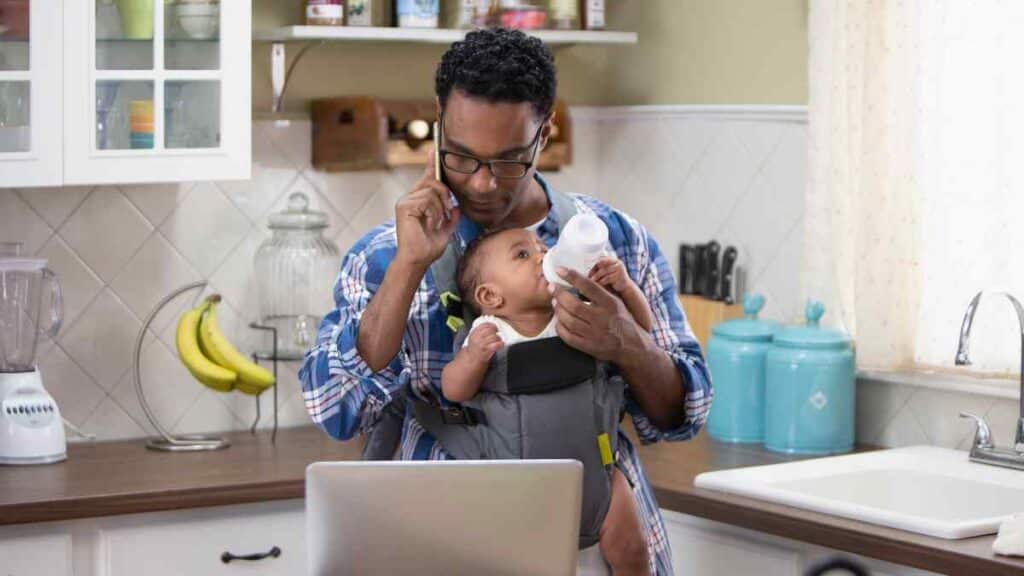
Pre-travel Preparation
Traveling with a baby requires meticulous planning, and ensuring that the baby’s feeding needs are met tops the list of priorities. When it comes to feeding your little one on the go, understanding the best practices for preparation and storage can make the journey smooth and stress-free. This column will offer insights into purchasing the right type of formula, deciding the quantity to carry, and ensuring the baby’s dietary needs, all essential steps in pre-travel preparation.
Purchasing the Right Type of Formula for Travel
- Understanding Baby’s Needs: Consider your baby’s age, dietary needs, and preferences when choosing the formula type. This includes whether to opt for powdered infant formula, ready-made formula, or other types.
- Water Considerations: Understand the differences between purified vs distilled water, or distilled vs purified water for baby, and choose the best water for baby formula accordingly. If you wonder, “is purified water the same as distilled water?” know that they differ in mineral content, and the choice may depend on baby’s specific requirements.
- Travel-Friendly Options: Consider formula dispensers, zip-lock bags, or travel bottle systems that allow you to pack formula in powder form, making bottle feeding more convenient on the go.
Deciding the Amount to Carry Based on Travel Duration
- Calculate Baby’s Needs: Estimate how many feedings you’ll need based on the baby’s feed schedule and duration of travel.
- Include Extras: Always carry a few extra servings for unexpected delays. This includes all the formula, bottles, and even a little extra purified or distilled water for babies.
- Carry-On Considerations: If traveling by plane, be familiar with airport security regulations, and pack reasonable quantities of formula in your carry-on bag, keeping in mind that it might be screened separately.
Ensuring Baby’s Dietary Needs
- Know Your Baby’s Formula: Stick with the brand and type your baby is accustomed to, and avoid experimenting during travel. If the baby has any allergies, make sure to pack specialized infant formula.
- Water Quality: Distilled or purified water for baby formula ensures quality. Consider baby water without fluoride, and understand the difference between nursery water vs distilled for specific requirements.
- Hygiene and Convenience: Include items like a bottle brush, sterilized bottles, wet wipes, and hot water facilities to warm baby milk. Many parents find a shoulder bag with compartments to be handy to organize all the essentials, including frozen gel packs to keep formula cold.
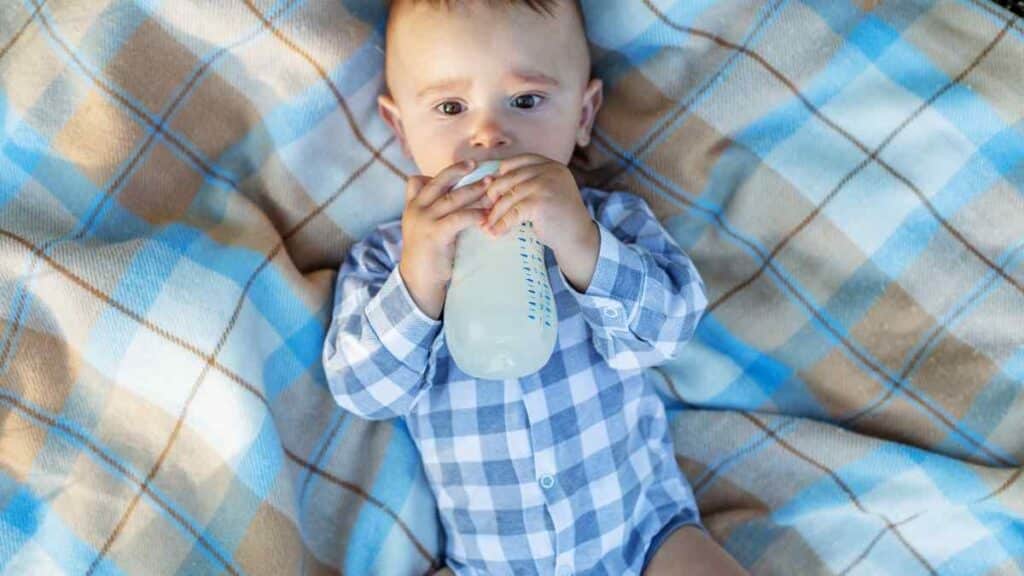
Choosing Appropriate Containers
When it comes to traveling with your baby, especially if your journey involves flights, selecting the right containers for storing baby formula is essential. The wrong choice could lead to leakage, spoilage, or even a run-in with airport security. Whether you are bottle feeding or planning to warm formula during your travels, knowing what to look for in containers can save time, prevent stress, and ensure that your baby’s nutritional needs are well taken care of. This column will explore how to select leak-proof, BPA-free containers, portioning considerations, and regulations for liquid carriage on airplanes.
Selection of Leak-Proof, BPA-Free Containers
1. Look for Quality: Choose baby bottles and formula bottles that are leak-proof to prevent spillage. Many bottles designed specifically for travel come with sealing disks or lids that prevent leaks.
2. Material Matters: Opt for BPA-free containers, which are safer for baby’s health. BPA-free bottles don’t contain the harmful chemicals found in some plastics.
3. Temperature Considerations: If you plan to warm formula, make sure the containers can withstand hot water or a bottle warmer without damage.
4. Convenience: Consider a bottle system with interchangeable parts or ones that can directly attach to the formula powder dispenser.
Portioning: Single-Serving Containers vs. Bulk
1. Single-Serving Containers: Pre-measured formula in single-serving containers can be a time-saver. It ensures you have the exact amount needed for each feeding, eliminating the guesswork.
2. Bulk Options: If traveling for an extended period or with a bottle-fed baby, you may want to carry formula powder in bulk. Make sure to have a reliable way to measure out each serving, like a scoop or pre-measured compartments.
3. Breast Milk Storage: For parents carrying breast milk, specific containers are designed to keep milk fresh and at the right temperature.
4. Formula Feeding Parent’s Choice: The choice between single-serving and bulk may depend on personal preferences, the baby’s feeding schedule, and the duration of travel.
Regulations Regarding Liquid Carriage on Airplanes
1. Understand Security Rules: Airports have specific regulations regarding the carriage of liquids. Be familiar with these rules and how they apply to baby food, bottled water, formula feeding, etc.
2. Declare Baby Essentials: Inform airport security about baby bottles, formula, and related items. They may be screened separately.
3. Bring Ice Packs: If you need to keep formula or breast milk cold, consider bringing ice packs. Check with airport security about how to pack these properly.
4. Sterilized Bottles: Carry sterilised bottles and be prepared to explain your needs if questioned by security.
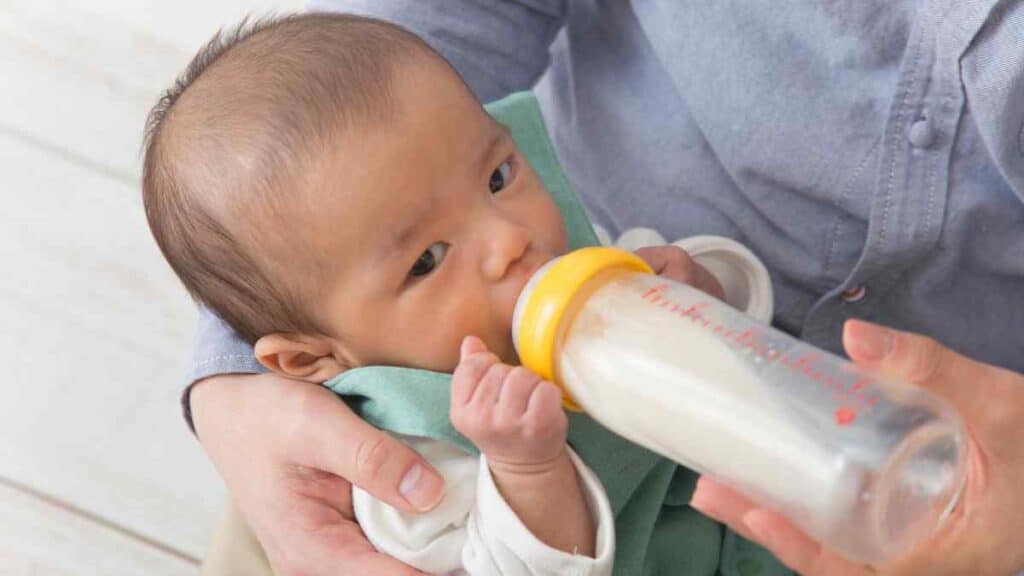
Emergency Solutions
Traveling with an infant requires careful planning, especially when it comes to feeding. However, even the best-laid plans can encounter unexpected delays or shortages that could lead to an urgent need for baby formula. Whether it’s a delayed flight or realizing you’ve run out of your baby’s preferred formula, knowing how to handle these emergencies can be a lifesaver. This column will cover essential tips for unexpected infant formula bottle delays or shortages and share insights on knowing local stores or brands, ensuring that your baby stays happy and well-fed even in unforeseen circumstances.
Tips for Unexpected Infant Formula Bottle Delays or Shortages
- Always Pack Extras: Carry extra formula bottles and pre-measured infant formula servings. Even a few additional servings can make a difference during unexpected delays.
- Utilize Available Resources: In a pinch, tap water can be used if bottled or boiling water is unavailable. However, always make sure it’s safe and clean, or opt for bottled water when in doubt.
- DIY Warming Techniques: If a bottle warmer is unavailable, you can warm bottles by placing them in hot water. Alternatively, holding a bottle under running warm water for a few minutes can bring it to the right temperature.
- Adapt with Available Items: In the absence of sterilized bottles, clean the best you can with hot water and soap. Also, a diaper bag can double as a cooler by adding a few ice packs or cold water bottles to keep formula cold.
- Create Makeshift Burp Cloths: If you run out of burp cloths, improvise with soft, clean fabrics like a towel or extra clothing.
Knowledge of Local Stores or Brands
- Research Ahead: Before traveling, especially internationally, research local stores that carry baby products, including infant formula. Knowing what’s available nearby can be crucial in emergencies.
- Understand Local Brands: Familiarize yourself with local formula brands and their ingredients. If your preferred brand isn’t available, knowing alternatives that suit your baby’s dietary needs is essential.
- Use Technology: Utilize maps or apps to find nearby stores that sell baby essentials. Most smartphones can guide you to the closest store with baby drinks, formula bottles, and other necessities.
- Ask for Help: Don’t hesitate to ask locals or hotel staff for directions to stores that carry baby products. They can often provide handy tips and insights into trusted local brands.
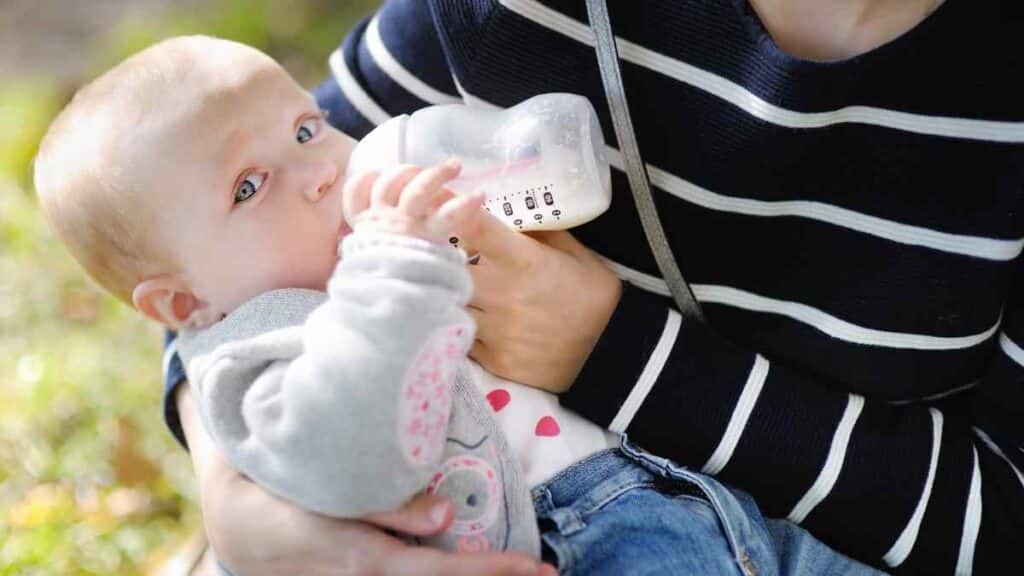
Conclusion
Traveling with a baby presents a unique set of challenges, but with careful planning and strategic preparation, it can be an enjoyable and memorable experience for the entire family. “Journey with Ease: A Comprehensive Guide to Storing Baby Formula While Travelling” has aimed to provide you with the essential knowledge, practical insights, and actionable tips you need to keep your baby fed and content during your travels.
As you embark on your next adventure with your little one, remember that being well-equipped and informed is half the battle won. Keep this guide handy, embrace the handy tips and strategies discussed, and you’ll find yourself navigating the world of traveling with baby formula like a seasoned pro.
May your travels be filled with joy, exploration, and the confidence that your baby’s nourishment is well taken care of. Happy journeying!
Did this article help you? Please leave a comment below. If you have any questions, please don’t hesitate to ask.



